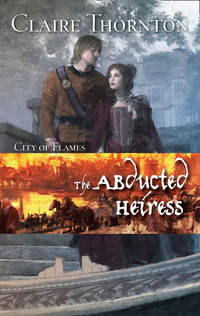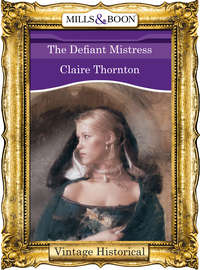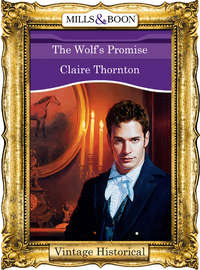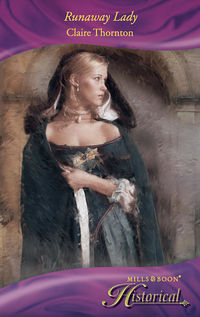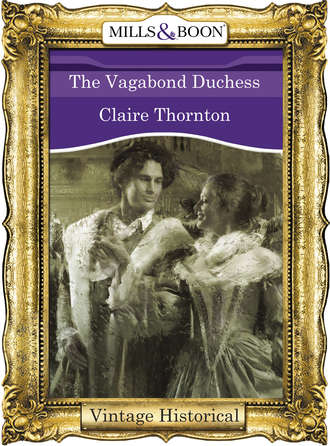
Полная версия
The Vagabond Duchess

Temperance hardly heard the duchess as she gazed unseeingly at the carved legs of the desk, finally allowing herself to believe Jack was alive.
Joyful excitement suddenly bloomed in her heart. She would see Jack again. She would!
New energy surged through her. She leaped to her feet—
And stumbled with shock as she registered what else the duchess had said.
“Your son?”
“Yes, he’s my son.”
“B-but…”
“Sometimes he calls himself Jack Bow,” said the duchess. “
But his full name is John Beaufleur, second Duke of Kilverdale.”
Praise for Claire Thornton
THE DEFIANT MISTRESS
“If you are looking for something decidedly out of the ordinary, this novel is worth checking out.
—All About Romance
“Sweeps readers from Cromwell’s London to France, Italy and back…colorful backdrop, varied settings and vivid details.”
—Romantic Times BOOKreviews
RAVEN’S HONOR
“Claire Thornton has written an exciting historical unlike anything I’ve read this past year…. I highly recommend this intoxicating love story.”
—Romance Junkies
GIFFORD’S LADY
“Claire Thornton is truly gifted in creating stories that are so unusual—with charismatic characters, intriguing plots and subtle humor. Her hero steps off the page and into your heart with his bravery and sensibilities.”
—Romance Junkies
“[Abigail] and Gif share a wonderfully tender and intimate love scene that’s one of the best I have read this year…. It’s a standout.”
—All About Romance
The Vagabond Duchess
Claire Thornton

www.millsandboon.co.uk
Author Note
The stories in the CITY OF FLAMES trilogy take place during the reign of Charles II. This was an era of great color, drama and variety. The king scandalized some of his subjects with his many mistresses, but his reign also saw the emergence of modern banking among the London goldsmiths. Actresses appeared for the first time in London theaters, while members of the Royal Society met every week to witness scientific experiments.
Athena Fairchild, Colonel Jakob Balston and the Duke of Kilverdale are cousins, but they’ve led very different lives. Athena grew up in England, Jakob in Sweden, and Kilverdale spent his childhood exiled in France as a result of the war between Charles I and Parliament.
The cousins’ romances take place in various locations, but London is at the heart of the CITY OF FLAMES trilogy. The cousins all meet the one they love in the city—although Athena’s happiness is destroyed almost before it begins.
Athena’s story, The Defiant Mistress begins in May 1666 in Venice and the events span the rest of the summer. Jakob’s story, The Abducted Heiress, and Kilverdale’s story, The Vagabond Duchess, both begin in London at the start of September 1666. In the early hours of the morning of 2 September, a fire in Pudding Lane will burn out of control….
While I was writing these books I fell in love with the characters and their world. I hope you enjoy reading their stories as much as I enjoyed writing them.
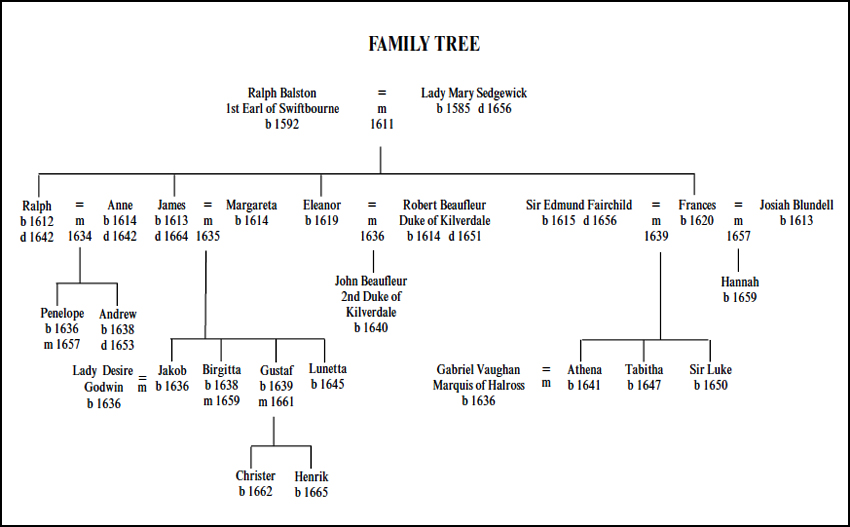
Contents
Prologue
Chapter One
Chapter Two
Chapter Three
Chapter Four
Chapter Five
Chapter Six
Chapter Seven
Chapter Eight
Chapter Nine
Chapter Ten
Chapter Eleven
Chapter Twelve
Chapter Thirteen
Chapter Fourteen
Chapter Fifteen
Chapter Sixteen
Chapter Seventeen
Chapter Eighteen
Chapter Nineteen
Epilogue
Prologue
The Palace of Whitehall, London, April 1666
A French youth sang a love song. A group of courtiers played basset around a large table, gambling huge sums with fashionable disregard for the consequences. The King lounged at his ease, amused by the clever, cynical conversation of his noble companions.
The Earl of Swiftbourne stood aloof from the clamour around him. He was nearly half a century too old to be part of the circle of witty young men who entertained the king, and too hard-headed to risk his fortune at the gambling table. He owed his status at court to the fact he’d been one of the men, along with the Duke of Albemarle, who’d helped Charles regain his throne. Swiftbourne was well aware royal gratitude could be fickle, but he was adept at navigating the hazards associated with power. For the time being, he was confident his position was secure.
A few feet away from Swiftbourne, an aristocratic rogue was trying to seduce one of the ladies of the court. From the tone of her responses, Swiftbourne judged the rogue was close to success. He ignored the couple as he focussed on the group around the King. His grandson, John Beaufleur, the Duke of Kilverdale, was among them.
Kilverdale was just short of twenty-six and in the prime of his youth and power. He looked every inch the courtier in his periwig, silk brocade coat and Venetian lace, but he also had the manners and intelligence necessary to hold his own in the Court of Charles II. It was an environment where little was sacred and noble poets could shred the reputation of a rival with a few anonymously circulated verses.
Kilverdale had been the target of such satires in the past, but now he was doing nothing more scandalous than asking the King’s permission to leave the country.
‘A retreat! Kilverdale seeks a retreat because he has been over-matched by Rochester’s wit!’ Fotherington exclaimed.
Swiftbourne controlled a scornful curl of his lip. The youthful Rochester was a fine poet and a brilliant conversationalist, but he did not intimidate Kilverdale. Swiftbourne was confident his grandson could match wits or swords with any man present should the need arise.
‘I must fetch my cousin from the English convent at Bruges, your Majesty,’ Kilverdale said.
‘A nun, by God!’ said Fotherington.
‘She is a guest of the nuns,’ Kilverdale said, continuing to address the King.
‘I visited the convent at Bruges myself, when I was on my travels,’ said Charles. ‘Remember me to the Abbess.’
Kilverdale bowed gracefully in acknowledgement of the request. His expression, as so often, was courteously unreadable. Swiftbourne knew the English nuns on the continent had done a great deal to help the King’s cause when he was in exile. The Abbess might justifiably have expected a little more from Charles than his remembrances now.
‘Is she beautiful?’ asked Fotherington. ‘I have heard rumours her name is Athena and your mother sent her to the nuns because she is so beautiful.’
‘You must present her to us,’ said the King, his interest caught.
‘I thank your Majesty for your kindness. She will be honoured to attend Court—but I must present her to my mother first,’ Kilverdale replied. ‘Athena has lived retired from the world for several years. She must become accustomed to society by degrees.’
‘Is she an heiress?’ asked one of the fops crowding around.
‘That depends on the quality of the man who courts her,’ Kilverdale said, a cold glint in his eye.
The fop opened his mouth and then shut it again. It was well known that, unlike many of the debt-ridden noblemen adorning Charles’s court, Kilverdale’s title was backed by a large fortune. The implication in his words was clear—if he approved a suitor for his cousin’s hand, he would bestow a dowry on her. If he didn’t approve of the man, he would be ruthless in preventing access to his cousin.
Of course, Kilverdale’s cousin was also Swiftbourne’s granddaughter, but Swiftbourne had no intention of interfering with Kilverdale’s plans for her. Athena had been living in the convent to hide from her abusive husband, but she’d recently been widowed. It seemed Kilverdale had decided it was time for her to return to England and make a more satisfactory second marriage. Despite his sometimes eccentric reputation, the Duke had always had a well-developed sense of responsibility for those who depended upon him. Swiftbourne was curious to discover what kind of matchmaker his grandson would prove. So far he’d been notably reluctant to enter marriage negotiations on his own behalf.
Kilverdale took formal leave of the King and turned to make his way out of the chamber. As he did so he looked straight at his grandfather for the first time.
Even after fifteen years it still shocked Swiftbourne to be confronted by that flat, hard gaze. There were times when he was convinced Kilverdale hated him, other times when he was sure ruthlessly controlled rage seethed behind the polite stare. And sometimes he caught glimpses of the devastated eleven-year-old boy whose world had been overturned by a few short words. It was those occasions Swiftbourne found most disturbing, though he always concealed his feelings behind the impenetrable mask of the professional diplomat.
‘My lord.’ Kilverdale paused to acknowledge his grandfather. ‘I am glad to see you in good health.’
‘Thank you,’ said Swiftbourne, allowing just a touch of irony to shade his cool response. ‘It’s an inconvenient time to cross the channel, now we’re at war with the French as well as the Dutch.’
Kilverdale raised one eyebrow. ‘I dare say the enemy will come to more harm than I if we encounter each other,’ he replied. ‘Good evening, my lord.’
‘Good evening.’ Swiftbourne watched Kilverdale walk away. Two sons and a grandson had already predeceased him—he did not wish to receive the news of this grandson’s death. Of all his children and grandchildren, Kilverdale was the one who most resembled him. Swiftbourne had survived seventy-four years with his health and wits intact and his fortune significantly enlarged. He comforted himself with the thought Kilverdale was more than capable of equalling that achievement.
Kilverdale was approached several times as he made his way out by his friends—or those who sought his friendship. Swiftbourne watched with cynical amusement as one enterprising girl nearly tripped up at Kilverdale’s feet in her efforts to catch his eye. It was far from the first time such a thing had happened. The young, unmarried and wealthy duke had been a target for matchmaking parents and ambitious daughters ever since he’d returned to England six years earlier.
Kilverdale restored the girl’s balance with a deft gesture, spoke a few coolly courteous words and moved on. The next attempt to waylay him was far more determined. The Earl of Windle stepped away from the basset table and moved directly in front of Kilverdale. Even at this distance Swiftbourne could see the bullish expression on Windle’s face. It was well known the Earl’s fortune was in a desperate state. His plans for recovery centred on finding a rich husband for his daughter. At first he’d tried to lure Kilverdale into marriage negotiations. Recently his attempts at persuasion had become less subtle. Swiftbourne began to stroll towards the two men.
‘I regret I do not have time to linger tonight, my lord,’ Kilverdale said.
‘You can spare the time to take some wine with me, I’m sure, your Grace,’ Windle replied unctuously.
‘Unfortunately not. I’m bound for Flanders at first light,’ said Kilverdale. ‘I—’ His eyes narrowed as Windle caught his coat sleeve.
The Earl flushed angrily, but released his grip. He was naturally inclined to be a bully, but Kilverdale’s prowess with a sword was too well known for Windle to risk forcing a quarrel on the Duke. ‘I will be pleased to travel with you to the coast so we can conclude our discussions before you leave,’ he said.
‘I do not recall starting a discussion with you that cannot be concluded with a simple “good evening”,’ Kilverdale said, turning away.
‘By God, Kilverdale, you must take a wife soon!’ exclaimed Fotherington. ‘Why not Windle’s daughter?’ He glanced between the two men, clearly hoping his meddling would incite some entertaining fireworks.
‘With all due courtesy to the Lady Anne, I am already committed to another,’ Kilverdale snapped. ‘Good night, my lords.’ He turned on his heel and strode out before any of them could respond.
After a second’s shock Swiftbourne found himself the focus of all eyes. He’d been as startled as the rest of them by his grandson’s announcement, but his expression remained impassive as he said, ‘Do not expect me to reveal Kilverdale’s secrets, gentleman. No doubt he will provide further enlightenment when it suits him.’
‘Are you in his confidence, my lord?’ Fotherington asked. ‘I had not realised you were on such warm terms with him these days.’
Swiftbourne raised an eyebrow. ‘I am pleased to assure you that Kilverdale and I enjoy terms of more than adequate warmth, sir,’ he said, and took even more pleasure in the way Fotherington wilted under his icy gaze.
There was a sudden commotion at the basset table as one of the players won a considerable sum. It was a signal for a general regrouping and a few moments later Swiftbourne discovered the King at his elbow.
‘Committed to a bride, or a paramour?’ Charles asked, a gleam of amusement in his eyes. ‘Either will be something of a novelty for Kilverdale—if there was any truth in what he said to Windle. Let us hope he returns swiftly to Court so we can enjoy the next act in this drama.’
Chapter One
London, Friday 31, August 1666
T emperance kept a wary eye on her surroundings as she followed the link boy through the dark streets. It was nearly midnight, and the bustling daytime crowds had long since gone home. Normally she would never venture out so late, but business had been slow all summer. She could not afford to lose the potential sale at the end of this journey. She listened for threatening sounds in the shadows and kept a firm grip on the stout stick she held by her side. She maintained an equally firm hold on the carefully packed goods she carried in her other arm.
The link boy stopped abruptly, lifting his torch to illuminate the sign of the Dog and Bone tavern. Temperance was so startled by the snarling beast revealed in the flickering light she took an involuntary step backwards.
‘Here you are,’ said the boy.
Temperance released a careful breath. After a second glance, she decided the sign was badly painted, not deliberately vicious. All the same, she wished her apprentice hadn’t been taken sick that afternoon. If Isaac hadn’t been near blind from the pain in his head, he could have come with her. His presence would have increased her status in the eyes of her potential customer.
She slipped the stick through a side opening in her skirts and hung it from a concealed belt. She took a coin from the pocket, which was also hidden beneath her skirts, and gave it to the link boy. Then she braced herself and pushed open the tavern door.
A thick fog of wine and tobacco fumes and too many closely packed bodies rushed out to greet her. Temperance stepped inside, realising at once that something unusual was happening. She’d anticipated the unpleasant smells. She hadn’t expected to be presented with an impenetrable wall of male shoulders the moment she stepped over the threshold. The men were all looking at something she couldn’t see, and blocking her from moving any further into the room. For an alarming moment she thought they might be watching a fight.
Her first instinct was to leave. She’d rather lose the sale than risk being caught up in a brawl. Then she realised the mood of the crowd was good humoured. She edged further into the room, trying to see what the men were looking at. She was tall enough to peer over the shoulders of most of those blocking her view, but the crowd was a couple of rows deep. Heads kept getting in her way. It was infuriating.
At last she tapped on the shoulder of one of the men. When he looked around, his eyes widened in surprise. She was about to ask him where the tavern keeper was, but he grinned and said, ‘Can’t see, lass? I’ll wager you’ll take more pleasure in looking than most of us will. Come through.’ He stepped back so she could move in front of him.
Temperance hesitated for half a second. It wasn’t sensible to let herself be hemmed in by a crowd of strangers—but curiosity got the better of her. With a murmur of thanks she accepted his offer. From her new position she could see all attention was focussed on a figure sitting near the unlit hearth. She’d just noticed he was holding a lute when he began to play. The crowd immediately fell silent.
At first Temperance couldn’t believe it. What kind of musician could hold a tavern of drinking men in thrall at nearly midnight? But after a few moments the music reached out to her, drawing her in as surely as it held the rest of the audience. She craned to one side, trying to get a better look at him. She saw a head of black hair and the flash of a white shirt before someone got in her way.
Then he began to sing. To her astonishment, she felt goose bumps rise all over her body. His voice curled deep down inside her, stirring nameless urges so intimate and disturbing part of her wanted to run away and hide. The rest of her wanted to get a lot closer. Such a thing had never happened to her before. Half-angry at her inexplicable reaction, but unable to deny her compulsion to look at the singer, she pushed forward until she was at the front of the standing crowd.
She clutched her bundle against her chest and stared at the musician. His black hair nearly reached his shoulders. It glowed like a raven’s wing in the candlelight, but it didn’t look as if it had ever been tamed by a barber. He’d taken off his coat, and his white shirt was open at the neck. She was fascinated by the movement of his strong throat as he sang. Her fingertips tingled with the urge to touch him there. To explore beneath the plain white linen.
When she became aware of the improper nature of her thoughts she flushed and directed her attention elsewhere. It didn’t help much. The soft linen revealed the breadth of his shoulders, and he’d pushed his sleeves back to his elbows. She watched the play of sinews in his forearm as his long fingers plucked the strings. He had clever hands, she thought dazedly, watching the swift surety with which his left hand moved over the neck of the lute. It was both exciting and unsettling to watch him play with such skill. The room seemed even hotter than it had a few moments ago.
He lifted his head and glanced around his audience. His dark brown eyes were set deep under black brows. He had a nose like a hawk, cheekbones to match and more than one day’s growth of stubble on his strong jaw. His voice might hold the allure of a fallen angel, enticing her to commit all kinds of sinful folly, but he looked like a vagabond.
His gaze passed over her in the crowd then returned to focus upon her face. His eyes locked with hers. Temperance stood rooted to the spot. He had seen her. His dark eyes seemed to pierce straight to her heart. A hot wave of self-conscious awareness rolled over her.
Just for a second she thought she heard a slight hesitation in his supple voice. Then she was sure she’d imagined it, because he continued to sing with utter confidence—and his lips curved in a small, but unmistakeably arrogant smile.
That smile jarred her out of her stupefaction. No doubt he took it for granted he could turn a woman’s knees weak with a simple song. He was surely a seducer and a vagabond who left broken hearts and lives behind him without a qualm. Temperance wrenched her gaze away from him, furious and embarrassed she’d fallen under his spell for even a few seconds. She gripped her bundle of goods so tightly her knuckles turned white.
She refused to look at the musician again, but she couldn’t stop listening. It was an irritating, tormenting pleasure. She wanted to listen to him, she just didn’t want to feed his arrogance by seeming to enjoy his song. She stared at the fireplace to one side of the musician and pretended she was indifferent to him. To her indignation a note of humour crept into his voice. Even though the taproom was full of people, she was certain he was singing to her—and laughing at her. It was insufferable. She glared at the mantelpiece. In an effort to distract herself she focussed on a crack in the plaster of the chimney breast, allowing her eyes to follow it all the way up to the ceiling. The amusement in his voice grew more pronounced; even the lute seemed to be laughing at her as he plucked a lively, teasing melody from its strings.
She realised too late it must have looked as if she’d stuck her chin in the air in response to his initial amusement. Very slowly, by casual degrees, she allowed her gaze to drop until she was once more looking at the mantelpiece. She kept her eyes fixed straight ahead and hoped the song would soon come to an end. How many verses did it have? Was he even singing the same song he’d started with? Or had he slid seamlessly into another one so he could deliberately prolong her discomfort? She stopped looking at the mantelpiece and stared at him suspiciously.
The fellow had the gall to grin at her! His fingers didn’t fluff a single note and his voice remained perfectly in tune—but he grinned at her!
How dare he! The urge to box his over-confident ears was almost too strong to resist. She imagined a discordant jangle and the pleasing sight of the dark-eyed vagabond wearing a necklace of lute strings and small fragments of wood around his cocksure neck.
A man beside her chuckled.
‘Jack Bow is singing for more than his supper now,’ he murmured. ‘Does he take your fancy, lass? You’ve surely taken his.’
‘No!’ Temperance’s denial emerged more forcefully than she’d intended. She saw several heads turn to look at her, and some men began to smile in an obnoxiously knowing way.
Her skin burned. She forgot her reason for coming to the tavern. All she wanted to do was remove herself from the mortifying situation at once. She was about to push through the crowd to the door when the musician ended the song with a flourish.
He was rewarded with applause and whistles. Several men called out to him, offering to buy him a drink. For a moment Temperance lost sight of him as the tavern patrons moved into new positions. She belatedly realised she wasn’t the only woman in the room—though at this hour of the night she was most likely the only respectable woman present. And she was only here because the plague that had devastated London the previous year had been so bad for business. The City was almost back to normal now, but if Temperance was to restore her shop to a sound footing she needed every sale she could make.
Where was the gentleman whose servant had roused her to wait on his master? She resisted the urge to glance in the direction of the singer and instead tried to locate the tavern keeper.
A door on the far side of the taproom crashed open. Temperance couldn’t see who came out, but then an irritable voice shouted, ‘Where the hell’s the draper I sent for?’
Temperance pushed her way towards her still-unseen customer. When she got closer she saw he’d just emerged from a private room that led off from the main taproom. He was a fashionably dressed young man, but his clothes were the worse for wear. He was also at least two inches shorter than Temperance.
He scowled at her when she stopped in front of him.
‘I want a draper, not an overgrown doxy,’ he said.
Temperance swallowed an angry response. His appearance was at least as unappealing as hers. Worse, in fact. She might be unusually tall and no great beauty, but at least she was sober and well groomed and didn’t wantonly insult strangers.


